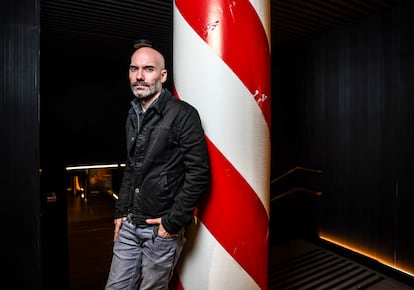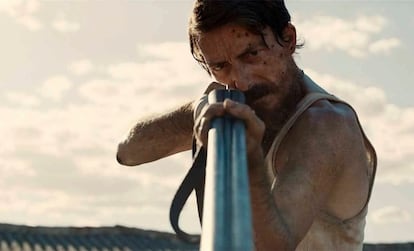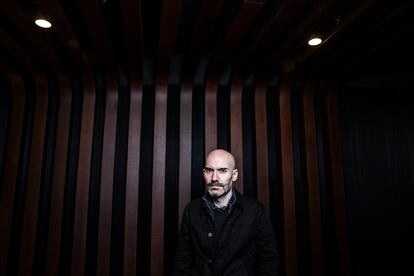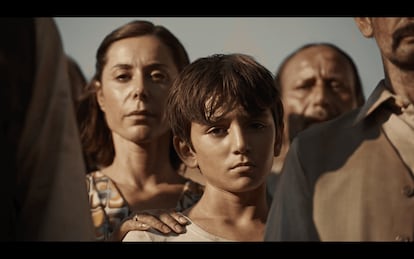The bittersweet battle of a Spanish filmmaker in Hollywood
Director F. Javier Gutiérrez, who has worked in Los Angeles since 2009, debuts ‘The Wait’, a thriller with touches of horror, and reflects on making films in the United States


It is difficult to wipe away the smile of F. Javier Gutiérrez, even with a conversation in which he describes his long and bittersweet trajectory as filmmaker. Based in Los Angeles since 2009, the 50-year-old director of Before the Fall (2008) and Rings (2017) is releasing The Wait, another thriller in the style of Before the Fall, although that movie fitted into the science fiction genre, and his third feature is a horror film, describing the journey to hell of the caretaker of a large farmhouse who, after accepting a bribe from the headhunter on the estate, suffers the collapse of his family and life. “I’m often asked if all these years in Hollywood has been worth it. And yes, I know the rules of the game, and I’m staying here,” he says into a tape recorder in a Madrid movie theater.
One can find certain parallels between the journey of Eladio, The Wait’s protagonist, and Gutiérrez’s career. Couldn’t daily struggle with big studios destroy anyone’s sanity? “It’s hard, sometimes incomprehensible, but you can never forget one thing: you’re not in control.” And so Gutiérrez begins to recount his trajectory, which began in a Córdoba videoclub, Fuentes Guerra. “That’s where, for years, during my childhood and adolescence, I would rent all kinds of movies. They wound up having copies of Before the Fall that I had signed, and closed soon after. I went through trauma when Fuente Guerra ended, because I grew up in those shelves.”
Gutiérrez studied law in Madrid, and there, he began to make his first films. One of them, Brazil (2002), made it to the Oscars shortlist, and led to his first trip to Los Angeles. “The producer Ed Pressman got in touch with me. He was a legend, he passed away last January.” Pressman produced Wall Street, The Crow, American Psycho… nearly 100 titles bear his stamp. At the time, Pressman wanted to do a remake of The Phantom of the Opera, and he called on the Spaniard. The project didn’t work out, due to issues around rights. So, Gutiérrez went back to Spain and filmed his first full-length, Before the Fall, whose title in Spanish, Tres días, refers to the time left before a meteor hits the earth. “It didn’t make a big impact at the box office. But it had enormous success at the festival, and was released throughout the world,” says the director, who this summer at an Austin (Texas) film festival, where The Wait was screened, was still being asked to sign several Before the Fall DVDs.
“In the U.S. they understand, as do many Spanish filmmakers, that fantasy films serve as a way to explore and stir up the conscience.”
Among those who saw Before the Fall was Wes Craven and, again, Pressman. “Wes was interested in making the U.S. remake of my film, and in me making a version of one of his, The People Under the Stairs. But unfortunately, it never happened. Wes signed a letter that allowed me to get my visa to work in the U.S. I still have it. And Pressman invited me on a fascinating adventure: a new version of The Crow.”

The Crow carries the aura of having been cursed. During the filming of its first version, in 1994, its protagonist Brandon Lee, the son of Bruce Lee, died due to a weapons accident. In 2010, the studio behind its remake, Relativity, had already tried out other directors and scripts, including one written by the musician Nick Cave. “But those scripts had departed from the essence of the character who had been created by James O’Barr,” says Gutiérrez, who contacted the graphic novel’s author via the internet. “He had no idea about the project. On my own dime, I took a plane to Dallas, explained to him what I wanted to do, and we became very good friends up to this day. His friendship is one of the things that has really fulfilled me during this entire process, because he is a true creator, a very sensitive and brilliant person. James created the graphic novel as a reflection of his personal experiences, which included a tragedy [his girlfriend died when she was hit by a drunk driver]. Because of that, there is a kind of poetic justice in O’Barr being involved in the new film [which will be released next year], even though I left the project a long time ago.”
Gutiérrez developed The Crow over the course of four years. “I met with every actor imaginable, many of whom are now stars, like Tom Hiddleston, James McAvoy and Mark Wahlberg,” he remembers. Ultimately, Luke Evans was chosen for the role. “We hired the master Rick Baker on makeup; Bo Welch, Tim Burton’s right-hand man, for the production design … I even did location scouting by helicopter in New Orleans, to see which roofs the protagonist would leap over. Then they decided to do it in Shanghai, and when I had my passport in hand, they canceled my trip because they moved the filming to the United Kingdom,” he says. Gutiérrez had signed a previous contract with Paramount to direct a sequel to The Ring. “The journey of The Crow was as enriching as it was emotionally exhausting. It went on for too long and I had to get out of my contract with Paramount,” which led him to a vital reflection: “They warned me the first time I moved to Los Angeles that I would have to get to know myself very well and be very sure of what I was doing, because it’s a city that eats you and destroys you. It’s such a difficult place that it teaches you a lot about yourself, you get to know yourself, you value and understand others in a different way. And you appreciate things that before, you didn’t even consider.”
The Spaniard talks to his mother and sisters almost every day. He has gone back to his hometown for Christmas whenever possible (sinusitis kept him in California one year). “But in Los Angeles, I’ve been on my own. And there’s no community of Spanish immigrants per se. Only a handful of filmmakers live there. The rest come and go. In fact, so many of the movies that you think come from a Hollywood studio are filmed in Europe, in places like the United Kingdom and Spain … That has nothing to do with facing a U.S. studio alone, which is very tiring. And you get a lot of good things out of it, that’s true. Like developing a tremendous inner strength, because you don’t have a producer to lend you a hand, because you’re the foreigner. I’ve been there for 13 years now and I’m still the foreigner,” he says.

Since he released Rings in 2017, Gutiérrez has been involved in other projects, some have been aborted, others have wound up with a different director. He can publicly say the names of a few like The Greys and House of Horror (which was ultimately released as Demonic). He has to stay quiet about the rest due to confidentiality agreements: “With time and after the dues I paid during the first years, when I got involved too passionately in projects, I have learned that there are decisions that you can’t fight because they depend on economic structures that are way above your head. You know what I have developed over time? The sense of smell to determine whether to take on a project or not, because I don’t want to waste four years on something that will never come out. Even so, putting all my experience in the U.S. on a scale, the good things win. What I don’t do is write scripts in the shadows. It’s lucrative, but I’m impractical financially. I’ve met all the great writers in the industry, I respect them all … And besides, am I really going to write something that will end up being completely out of my control?”
Denzel Washington, a good advisor
During post-production for Rings, Gutiérrez coincided with Denzel Washington, who was finishing Fences at the time. “I was able to bring visual aspects to Rings, but my creativity was very constrained. At least, I was able to make it do well at the box office. I talked to Denzel a lot, and he said, ‘You’re not an industrial director. You have to do a good job finishing Rings, make it work, and then something of your own. One movie for the industry, and one for your soul.’ Well, at least I managed to get Rings to do well at the box office.”

That’s how The Wait happened. “I always stick up for Spain. I have fought for Hollywood projects to be filmed here, like Brad Pitt’s Allies. I have fought to make films with international trips to Spain ... I haven’t been able to make it happen. That frustrates me. I filmed The Wait with no help, with the support of just one television channel, Canal Sur, with the work of two producers, shooting on the run, sometimes in a single take, with a dwindling crew…” Gutiérrez takes a breath and continues: “In the U.S. they understand, as do many Spanish filmmakers, that fantasy films serve as a way to explore and stir up the conscience; that with them you can reach other levels, another audience, that you can’t reach with a pure and hard drama. Look at the success of Parasite at the Oscars. In contrast, the Spanish Academy is more faint-hearted, it doesn’t nominate those films for the Goyas.”
In The Wait he talks about the feudalism of Spain, about ancestral fears. “I could have put in a portrait of Franco, but I avoided that. I want to transcend. In Austin, they saw it as a Western, in Spain it could even be understood as the pernicious influence of fascism, which is resurfacing today. The Wait has been made against the tide, and at the same time it has a commitment to the audience and a love for the most classic of cinema.”
Now, he’s going back to Los Angeles. “I’ll be back there working on personal projects. As I told you at the beginning, I know the rules, I’ll play with them.”
Sign up for our weekly newsletter to get more English-language news coverage from EL PAÍS USA Edition
Tu suscripción se está usando en otro dispositivo
¿Quieres añadir otro usuario a tu suscripción?
Si continúas leyendo en este dispositivo, no se podrá leer en el otro.
FlechaTu suscripción se está usando en otro dispositivo y solo puedes acceder a EL PAÍS desde un dispositivo a la vez.
Si quieres compartir tu cuenta, cambia tu suscripción a la modalidad Premium, así podrás añadir otro usuario. Cada uno accederá con su propia cuenta de email, lo que os permitirá personalizar vuestra experiencia en EL PAÍS.
¿Tienes una suscripción de empresa? Accede aquí para contratar más cuentas.
En el caso de no saber quién está usando tu cuenta, te recomendamos cambiar tu contraseña aquí.
Si decides continuar compartiendo tu cuenta, este mensaje se mostrará en tu dispositivo y en el de la otra persona que está usando tu cuenta de forma indefinida, afectando a tu experiencia de lectura. Puedes consultar aquí los términos y condiciones de la suscripción digital.








































